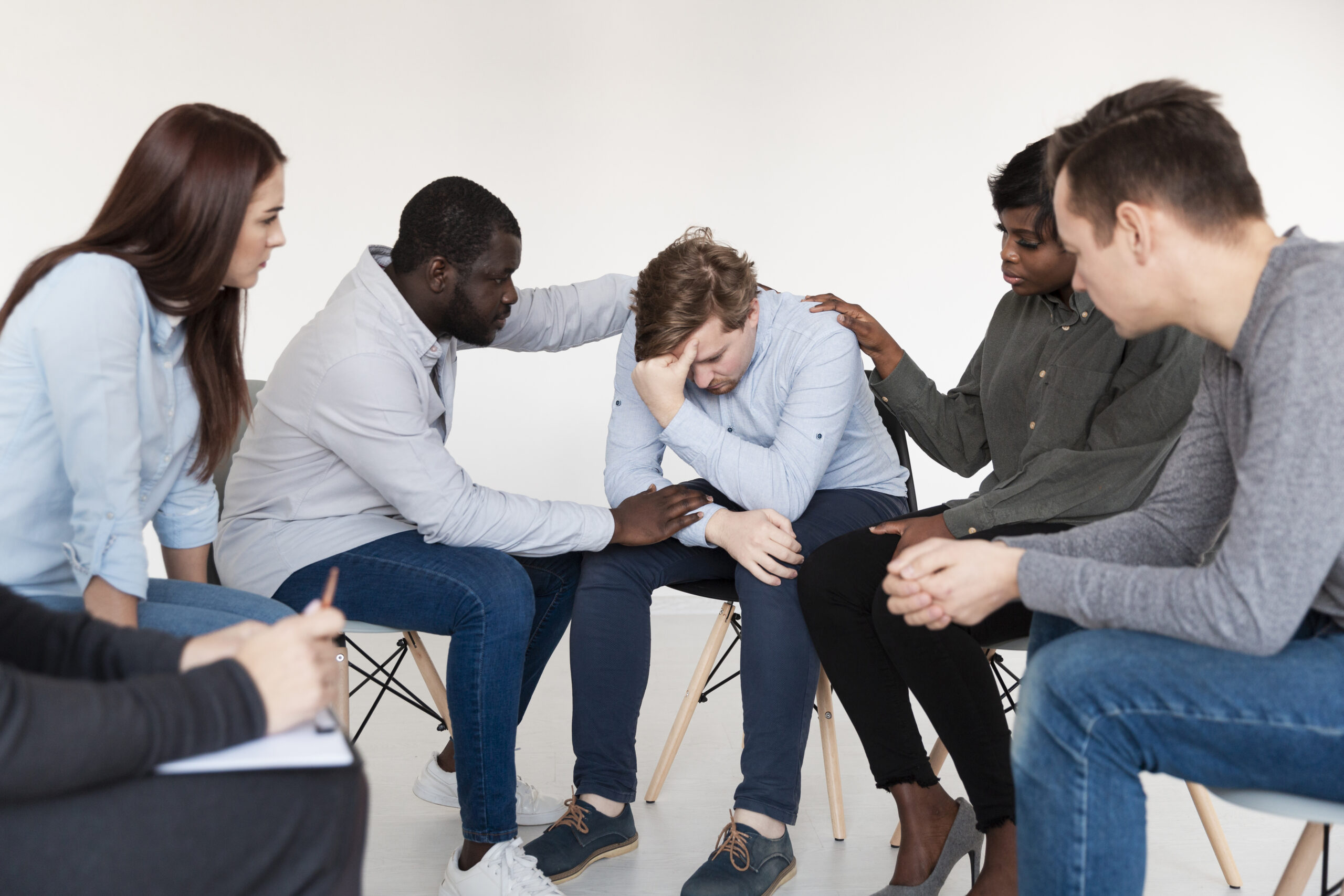When seeking support for mental health challenges, individual therapy often comes to mind first. However, group therapy offers a unique and powerful pathway to healing and recovery that can be incredibly effective for many patients. This collaborative approach brings together individuals facing similar struggles, fostering a sense of community and shared understanding. This blog post will explore how group therapy supports healing and recovery, delve into its key benefits such as peer support, skill development, and accountability, and help you determine who should consider this valuable form of counseling.
How Group Therapy Supports Healing and Recovery
Group therapy is a form of psychotherapy where a group of individuals meets regularly with one or more trained therapists to discuss their challenges and work towards personal growth. The dynamic within a group setting provides a unique environment for healing that complements individual therapy [1].
Universality: You Are Not Alone
One of the most profound aspects of group therapy is the realization of universality. Many individuals struggling with mental health issues feel isolated and believe they are the only ones experiencing certain thoughts or feelings. In a group setting, hearing others share similar struggles can be incredibly validating and reassuring. This shared experience helps to break down feelings of loneliness and shame, fostering a sense of connection and belonging [2]. As Irvin Yalom, a pioneer in group psychotherapy, noted, “Many patients enter therapy with the secret dread that they are unique in their wretchedness” [3]. Group therapy dispels this dread.
Instillation of Hope
Witnessing others in the group who have made progress or successfully navigated challenges can instill a powerful sense of hope. Seeing that recovery is possible and that others have overcome similar obstacles can be a significant motivator for individuals who may feel stuck or discouraged. This vicarious learning and inspiration can be a driving force in their own healing journey [4].
Altruism: Giving and Receiving Support
Group therapy provides an opportunity for altruism, where members can offer support, insights, and encouragement to one another. This act of helping others can be deeply therapeutic in itself, shifting focus away from one’s own problems and fostering a sense of purpose and self-worth. The reciprocal nature of support—both giving and receiving—strengthens bonds and reinforces positive coping mechanisms [5].
Corrective Recapitulation of the Primary Family Group
For some, group therapy can serve as a corrective emotional experience. The group dynamic often mirrors family interactions, allowing individuals to re-experience and work through unresolved conflicts or unhealthy patterns of relating that originated in their primary family. Under the guidance of a therapist, members can learn new, healthier ways of interacting and communicating, leading to improved relationships outside the group [6].
Interpersonal Learning
Group therapy is an ideal setting for interpersonal learning. Through interactions with other members, individuals receive immediate feedback on their behavior and communication styles. This allows them to gain a deeper understanding of how they are perceived by others and how their actions impact relationships. It provides a safe space to experiment with new behaviors, practice assertiveness, and develop more effective social skills [7].
Key Benefits: Peer Support, Skill Development, and Accountability
Beyond the foundational elements of healing, group therapy offers specific, tangible benefits that contribute significantly to a patient’s recovery.
Peer Support: The Power of Shared Experience
As highlighted in the previous blog post on peer support, the connection with others who have lived experience with similar mental health challenges is incredibly powerful. In group therapy, this peer support is a cornerstone. Members can offer empathy, validation, and practical advice that comes from firsthand understanding. This creates a non-judgmental environment where individuals feel truly understood, reducing feelings of isolation and fostering a sense of community [8]. The informal nature of peer interactions within a structured therapeutic setting can make it easier for individuals to open up and share their vulnerabilities.
Skill Development: Learning and Practicing New Coping Mechanisms
Group therapy is an excellent platform for developing and practicing new coping skills. Therapists often introduce and teach specific techniques, such as mindfulness, communication strategies, emotion regulation skills, or problem-solving approaches. Members can then practice these skills in a safe, supportive environment, receiving feedback from both the therapist and other group members. This real-time application and feedback accelerate the learning process and help individuals integrate these skills into their daily lives [9]. For example, a group focused on anxiety might practice relaxation techniques together, or a group addressing anger management might role-play difficult conversations.
Accountability: Staying on Track with Goals
The group setting provides a built-in system of accountability that can be highly motivating. When individuals share their goals and progress with the group, they often feel a stronger commitment to follow through. Knowing that other members are invested in their success and will check in on their progress can provide the extra push needed to stay on track with treatment plans and personal goals. This collective encouragement and gentle challenge from peers can be more impactful than individual accountability alone [10].
Who Should Consider Group Therapy?
Group therapy is a versatile and effective treatment modality, but it’s not a one-size-fits-all solution. It can be particularly beneficial for individuals dealing with a wide range of mental health concerns and life challenges.
Common Conditions and Issues Addressed
Group therapy is often recommended for individuals struggling with:
•Depression and Anxiety: Groups can provide a supportive environment to share experiences, learn coping strategies, and reduce feelings of isolation associated with these conditions [11].
•Substance Use Disorders: Many recovery programs heavily rely on group therapy, as the peer support and accountability are crucial for maintaining sobriety and preventing relapse [12].
•Trauma and PTSD: Specialized trauma-focused groups can help individuals process traumatic experiences in a safe and structured environment, often alongside others who have similar experiences [13].
•Grief and Loss: Support groups for grief and loss provide a space for individuals to share their feelings, cope with bereavement, and find comfort in collective understanding [14].
•Eating Disorders: Group therapy can address body image issues, unhealthy eating patterns, and provide a supportive community for recovery [15].
•Relationship Issues: Groups can be an excellent setting to explore interpersonal dynamics, improve communication skills, and learn healthier ways of relating to others [16].
When Group Therapy Might Be a Good Fit
Consider group therapy if you:
•Feel Isolated or Alone: If you’re struggling with feelings of loneliness or believe no one understands what you’re going through, a group can provide a sense of belonging and connection [17].
•Want to Improve Social Skills: The interactive nature of group therapy offers a safe space to practice communication, assertiveness, and other social skills in a real-world context [18].
•Benefit from Peer Support: If you find comfort and motivation in connecting with others who share similar experiences, the peer support aspect of group therapy will be highly beneficial [19].
•Are Open to Feedback: Group therapy involves receiving feedback from both the therapist and other members. If you are open to hearing different perspectives and learning from others’ insights, you will thrive in this setting [20].
•Seek Accountability: If you need external motivation and support to stay committed to your treatment goals, the accountability offered by a group can be a powerful tool [21].
•Are Looking for a Cost-Effective Option: Group therapy is often more affordable than individual therapy, making it a more accessible option for many [22].
When Individual Therapy Might Be Preferred (or Combined)
While group therapy is highly effective, it may not be the initial best fit for everyone. Individuals experiencing severe symptoms, acute crises, or those who prefer a highly private setting might benefit more from starting with individual therapy. However, many find that combining individual and group therapy offers the most comprehensive and effective treatment approach, allowing for both deep personal work and the benefits of community support [23].
Conclusion
Group therapy is a powerful and often underestimated tool in the landscape of mental health treatment. By providing a unique blend of universality, hope, altruism, and interpersonal learning, it creates a supportive community where individuals can heal, grow, and develop essential coping skills. The benefits of peer support, skill development, and accountability make it an invaluable resource for a wide range of mental health challenges. If you are seeking a path to recovery that offers connection, understanding, and practical tools, group therapy might be the transformative experience you need. Consider exploring this option and discovering the strength that comes from shared journeys.
SEO Keywords: group therapy benefits, mental health therapy, counseling services
References
[1] Group Therapy – StatPearls – NCBI Bookshelf. (2024, October 29). Retrieved from



